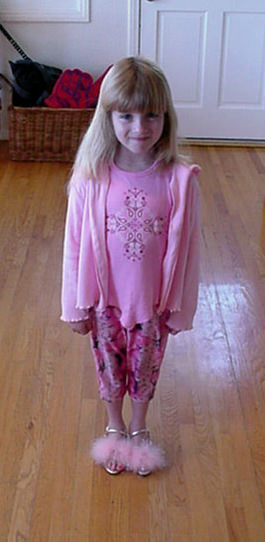The Blue / Pink Thing
The Blue Pink Thing is a simple term for the obvious (and not so obvious) differences between the genders. If you’re raising both boys and girls, I’m sure you are already aware of the Blue Pink Thing. As John Gray put it, “Men are from Mars and Women are from Venus,” and those differences manifest at a very early age.
 Little boys turn pencils into guns. Little girls like to dress up and practice twirling. As toddlers, our boys could spend five to ten minutes doing a puzzle and then it was on to the next thing. Our daughter, on the other hand, could sit with a puzzle for forty minutes. She clearly exhibited much better focus at a far earlier point than the boys. Our sons plowed their way through high school meeting their obligations and having a single, unchanging set of buddies. Our daughter’s peer group changed like fashion… one day you were in, the next day you were out. Once the boys went away to college, where they had to co-habit with people their age, things began clicking into place – like the need to wash clothes, dishes, and sheets.
Little boys turn pencils into guns. Little girls like to dress up and practice twirling. As toddlers, our boys could spend five to ten minutes doing a puzzle and then it was on to the next thing. Our daughter, on the other hand, could sit with a puzzle for forty minutes. She clearly exhibited much better focus at a far earlier point than the boys. Our sons plowed their way through high school meeting their obligations and having a single, unchanging set of buddies. Our daughter’s peer group changed like fashion… one day you were in, the next day you were out. Once the boys went away to college, where they had to co-habit with people their age, things began clicking into place – like the need to wash clothes, dishes, and sheets.
Our daughter, Emily, has been sensitive and on-the-lookout since she was about seven years old. She was keenly aware of her shifting friends. Even in middle school she was providing therapy for those with less fortitude. She saw it as her job to know where everyone in the family was and how they were feeling at any time. To this day, she communicates with each of her brothers from college at least once a day.
 I suppose that hyper-connectivity can be attributed to our cell phones, texts, Instagram and emails, but, even in circumstances as simple as actual conversation, we have noticed differences. The boys, when younger, weren’t interested in long conversations about their emotions. But Emily could dissect every element of her feelings, and even invoke historical events we had long forgotten. For example, “Benjy’s bedtime was nine o’clock when he was my age. Why is mine eight thirty?” I couldn’t have remembered Benjy’s bedtime if I was pumped with truth serum and undergoing a polygraph test.
I suppose that hyper-connectivity can be attributed to our cell phones, texts, Instagram and emails, but, even in circumstances as simple as actual conversation, we have noticed differences. The boys, when younger, weren’t interested in long conversations about their emotions. But Emily could dissect every element of her feelings, and even invoke historical events we had long forgotten. For example, “Benjy’s bedtime was nine o’clock when he was my age. Why is mine eight thirty?” I couldn’t have remembered Benjy’s bedtime if I was pumped with truth serum and undergoing a polygraph test.
As many of you know, I believe our most important job as parents is to set an example, and Emily is a beneficiary JoAnn’s excellent relationship with her mother. In fact, that relationship motivated us to go for “one more” when considering the hopeful addition of a female child to our family.
As JoAnn describes it, her mother was stern – but never shrill or out of control. JoAnn’s mother was always encouraging and used “expectation” as her strongest ally. “How could someone like you become involved in a situation like this?” She’d say. She had the highest possible expectation of JoAnn (as she did for herself), and somehow she and JoAnn made it through JoAnn’s teen years without all the familiar mother-teen daughter arguments.
 As I watch JoAnn and Emily together, I see a similar bond has developed. JoAnn and Emily are collaborators. They discuss clothing, television, Emily’s friends, and, I’m sure, her brothers and me in loving confidence. Many people tell us about their rebellious teenage children (especially daughters), who withhold information, sit quietly in the car, and go straight to their rooms when arriving home from school. Although Emily is occasionally guilty of some of that behavior, I believe that, from the time she was young, she has always been able to confide in JoAnn who has always listened to, and respected, what Emily has had to say.
As I watch JoAnn and Emily together, I see a similar bond has developed. JoAnn and Emily are collaborators. They discuss clothing, television, Emily’s friends, and, I’m sure, her brothers and me in loving confidence. Many people tell us about their rebellious teenage children (especially daughters), who withhold information, sit quietly in the car, and go straight to their rooms when arriving home from school. Although Emily is occasionally guilty of some of that behavior, I believe that, from the time she was young, she has always been able to confide in JoAnn who has always listened to, and respected, what Emily has had to say.
Additionally, JoAnn has never judged Emily for her thoughts or ideas. That relationship hasn’t changed, only the subject matter. Emily is not afraid to speak with us about her friends. She knows we’re not going to call their parents (unless they’re doing something really destructive), and, if we were, she knows we would discuss it with her first. She also knows that we’re not going to dive into her problems and intercede, so our discussions with her (and this is primarily JoAnn’s territory) are often consultations about the best way to handle her own situations.
The boys and I had our own unique relationship. We washed cars, played catch, watched sports, told jokes and talked a lot about life. My father had always been “instructional,” so I spent a lot of time just trying to teach them various skills and toughen them up …be brave, don’t cry, “walk it off.” We were not immune to discussions of emotional issues, but those conversations were often intertwined with a task. When they happened, they were quick discussions of problems and potential solutions – very male.
Throughout it all, JoAnn and I were always consulting with each other so that if an issue arose, we’d likely be on the same page.
 Today, our kids are still willing to discuss their issues with us. Not because we did anything miraculous – but because we understood that they were growing, changing individuals and as such could not be expected to stay the same – whether that related to hair styles, friendships, or even doing things we thought were crazy (like parachuting out of airplanes).
Today, our kids are still willing to discuss their issues with us. Not because we did anything miraculous – but because we understood that they were growing, changing individuals and as such could not be expected to stay the same – whether that related to hair styles, friendships, or even doing things we thought were crazy (like parachuting out of airplanes).
I was about twenty when my mother questioned a specific decision that I had made. I was pretty sure of the decision, so I said to her, “You taught me how to think. I’m using the brain you programmed to make this decision. I think you did a good job – now you have to believe in it.”
When the kids were young, JoAnn and I would discuss our “position” prior to our conversations with them. We’d bounce the issues around, and usually determine an opinion or course of action together. Then, depending on how it unfolded, the issue would be discussed with our offspring.
Through this process, they have learned to trust us, and see that we trust and respect each other. We have high expectations of them, and they know that our expectations of ourselves, with regard to honesty, truth, and respect, are equally as high. That formula allows them to seek and respect our opinions.
It should be clear to any parent that raising boys and raising girls is often a different process. The basics are the same, the rules should remain solid, but the day-to-day communication of objectives, and the application of opinion, guidance, and critique often need to be handled differently by gender (at least if you want your messages to be heard). As a flexible, understanding parent, this won’t be anything that requires a special translator, or different family meetings, it’s just a heads up to you fellas out there that raising a girl requires more conversation and patience than putting your boy through his paces. As you can see from the funny photo though – we’re still kind of old-fashioned.
In the end, teaching them all to be loving people is really what it’s about. If you can do that… you’ve got it made.


Leave a Reply
Want to join the discussion?Feel free to contribute!